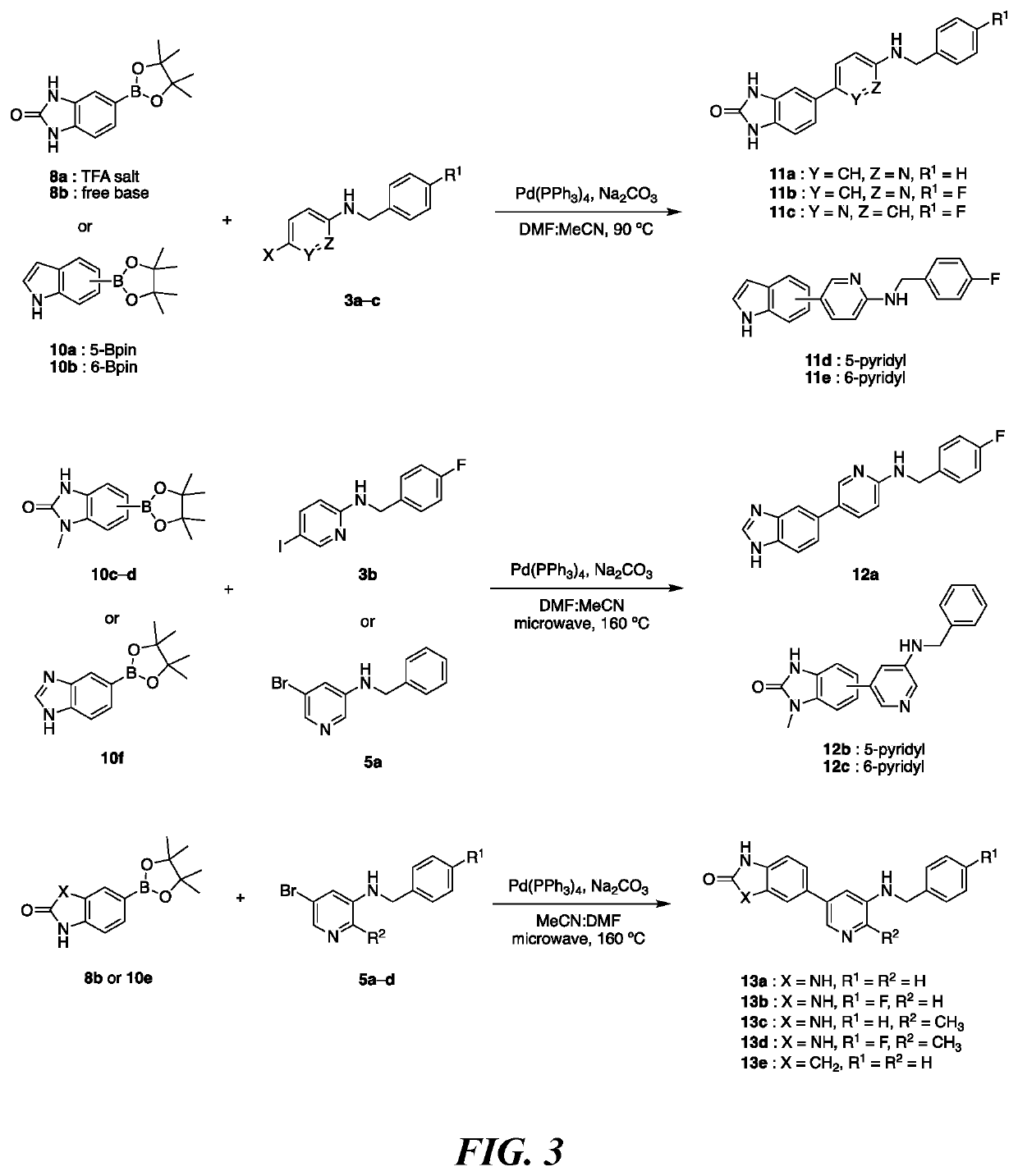Kinase inhibitor compounds and compositions and methods of use
- Summary
- Abstract
- Description
- Claims
- Application Information
AI Technical Summary
Benefits of technology
Problems solved by technology
Method used
Image
Examples
example 1
of Pyridine Based DYRK1A Inhibitors
[0224]General Experimental Conditions. All reactions involving air-sensitive reagents were carried out with magnetic stirring and in oven-dried glassware with rubber septa under argon unless otherwise stated. All commercially available chemicals and reagent grade solvents were used without further purification unless otherwise specified. Thin-layer chromatography (TLC) was performed on Baker-flex® silica gel plates (IB2-F) using UV-light (254 and 365 nm) detection or visualizing agents (ninhydrin or phosphomolybdic acid stain) and flash chromatography was carried out on silica gel (230-400 mesh) using Teledyne Isco CombiFlash® Rf. NMR spectra were acquired at room temperature using a Bruker DRX-600 spectrometer at 600 MHz for 1H and 150 MHz for 13C. Chemical shifts (δ) are given in parts per million (ppm) with reference to solvent signals [1H-NMR: CDCl3 (7.26 ppm), CD3OD (3.30 ppm), DMSO-d6 (2.49 ppm); 13C-NMR: CDCl3 (77.0 ppm), CD3OD (49.0 ppm), D...
example 2
rocedure for the Preparation of N-Benzylhalopyridinamine—Method A
N-Benzyl-5-iodopyridin-2-amine (3a)
[0225]
[0226]To a solution of 5-iodopyridin-2-amine (1a) (200.0 mg, 0.91 mmol) in anhydrous 1,2-dichloroethane (8 mL) was added benzaldehyde (2a) (0.09 mL, 0.91 mmol), sodium triacetoxyborohydride (250.5 mg, 1.18 mmol) and acetic acid (0.16 mL, 2.73 mmol) under nitrogen. The resulting mixture was stirred at 60° C. for 6.5 h. After being quenched with H2O (5 mL), the aqueous layer was extracted with EtOAc (2×20 mL). The combined organic extracts were washed with brine, dried over anhydrous Na2SO4, filtered, and concentrated. The residue was purified by column chromatography on silica gel (EtOAc / hexane, 15:85 to 30:70) to afford 3a (103.8 mg, 37%) as a white solid; 1H NMR (CDCl3, 600 MHz) 8.19 (1H, s), 7.58 (1H, d, J=9.8 Hz), 7.34 (4H, s), 7.30-7.29 (1H, m), 6.22 (1H, d, J=8.5 Hz), 5.19 (1H, br), 4.47 (2H, d, J=4.9 Hz); HRMS (ESI-TOF) m / z: [M+H]+ calculated for C12H12IN2 311.0040; found ...
example 3
rocedure for the Preparation of N-Benzylhalopyrimidin-Amine—Method B
N-Benzyl-5-bromopyridin-3-amine (5a)
[0231]
[0232]To a solution of 5-bromopyridin-3-amine (4a) (330.0 mg, 1.91 mmol) in anhydrous acetonitrile (10 mL) was added benzaldehyde (2a) (0.19 mL, 1.91 mmol), triethylsilane (1.62 mL, 10.11 mmol) and trifluoroacetic acid (0.82 mL, 10.68 mmol) under nitrogen. The resulting mixture was refluxed for 16 h. After being quenched with sat. NaHCO3 (5 mL), water and EtOAc were added. The layers were separated. The combined organic phases were washed with brine, dried over anhydrous Na2SO4, filtered, and concentrated. The residue was purified by column chromatography on silica gel (EtOAc / hexane, 40:60) to afford 5a (377.5 mg, 75%) as a yellow solid; 1H NMR (CDCl3, 600 MHz) 7.96 (1H, d, J=2.4 Hz), 7.93 (1H, d, J=2.4 Hz), 7.37-7.29 (5H, m), 7.00 (1H, d, J=2.4 Hz), 4.49 (1H, br), 4.29 (2H, s); HRMS (ESI-TOF) m / z: [M+H]+ calculated for C12H1279BrN2 and C12H1281BrN2 263.0178, 265.0158; found...
PUM
| Property | Measurement | Unit |
|---|---|---|
| Cell proliferation rate | aaaaa | aaaaa |
Abstract
Description
Claims
Application Information
 Login to View More
Login to View More - R&D
- Intellectual Property
- Life Sciences
- Materials
- Tech Scout
- Unparalleled Data Quality
- Higher Quality Content
- 60% Fewer Hallucinations
Browse by: Latest US Patents, China's latest patents, Technical Efficacy Thesaurus, Application Domain, Technology Topic, Popular Technical Reports.
© 2025 PatSnap. All rights reserved.Legal|Privacy policy|Modern Slavery Act Transparency Statement|Sitemap|About US| Contact US: help@patsnap.com



